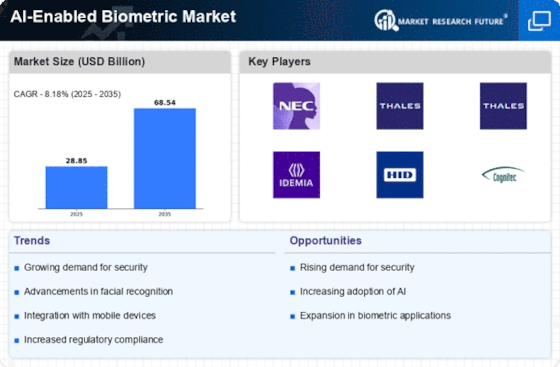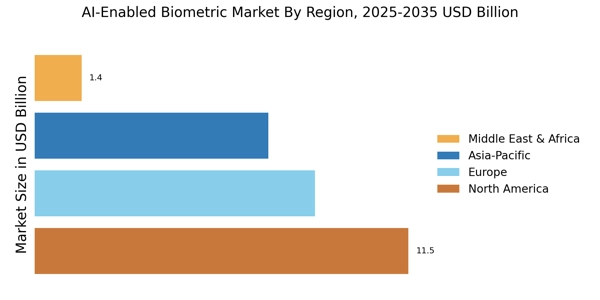Integration of AI Technologies
The integration of AI technologies into biometric systems is a pivotal driver for the AI-Enabled Biometric Market. AI enhances the accuracy and efficiency of biometric recognition processes, allowing for faster and more reliable identification. For instance, machine learning algorithms can analyze vast datasets to improve facial recognition capabilities, reducing false positives and negatives. This technological advancement is expected to propel the market, with projections indicating a compound annual growth rate (CAGR) of over 20% from 2023 to 2025. As organizations seek to streamline operations and enhance user experiences, the demand for AI-driven biometric solutions is likely to increase, making this integration a cornerstone of future developments in the industry.
Consumer Awareness and Acceptance
Consumer awareness and acceptance of biometric technologies are crucial drivers for the AI-Enabled Biometric Market. As individuals become more informed about the benefits of biometric authentication, such as enhanced security and convenience, the adoption rate is likely to increase. Surveys indicate that a significant percentage of consumers are willing to use biometric solutions for secure transactions and identity verification. This growing acceptance is encouraging businesses to implement AI-enabled biometric systems to meet consumer expectations. Furthermore, as public awareness campaigns highlight the advantages of biometric technologies, the market is poised for expansion, with a potential increase in user adoption rates in the coming years.
Growing Regulatory Compliance Requirements
The AI-Enabled Biometric Market is significantly influenced by the growing regulatory compliance requirements across various jurisdictions. Governments and regulatory bodies are increasingly mandating the use of biometric authentication to enhance security and protect personal data. For example, regulations such as the General Data Protection Regulation (GDPR) in Europe emphasize the need for secure data handling practices. This regulatory landscape compels organizations to adopt AI-enabled biometric solutions to ensure compliance and avoid hefty fines. As a result, the market is expected to expand, with businesses investing in biometric technologies to meet these legal obligations. The interplay between regulation and technology adoption is likely to shape the future of the AI-enabled biometric sector.
Increased Investment in Smart Technologies
The AI-Enabled Biometric Market is witnessing increased investment in smart technologies, which is driving innovation and market growth. Companies are allocating substantial resources to develop advanced biometric solutions that leverage AI for improved performance. This trend is evident in the rise of smart devices equipped with biometric capabilities, such as smartphones and wearables. The market for smart biometric devices is projected to grow significantly, with estimates suggesting a value of USD 30 billion by 2025. As consumers demand more secure and convenient authentication methods, businesses are compelled to innovate, leading to a competitive landscape that fosters the development of cutting-edge AI-enabled biometric technologies.
Rising Demand for Enhanced Security Solutions
The AI-Enabled Biometric Market is experiencing a notable surge in demand for enhanced security solutions across various sectors. Organizations are increasingly adopting biometric systems to mitigate security risks and protect sensitive data. According to recent estimates, the biometric market is projected to reach USD 60 billion by 2025, driven by the need for robust authentication methods. This trend is particularly evident in sectors such as banking, healthcare, and government, where security breaches can have dire consequences. The integration of AI technologies into biometric systems further enhances their effectiveness, enabling real-time threat detection and response. As cyber threats evolve, the reliance on AI-enabled biometric solutions is likely to grow, positioning this market as a critical component of modern security infrastructure.

















